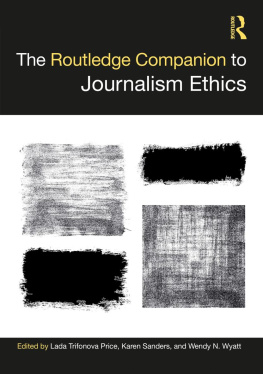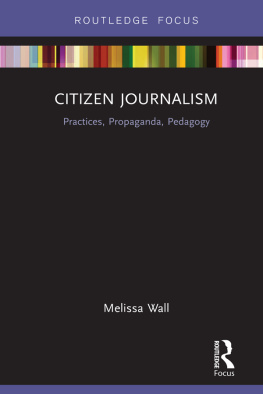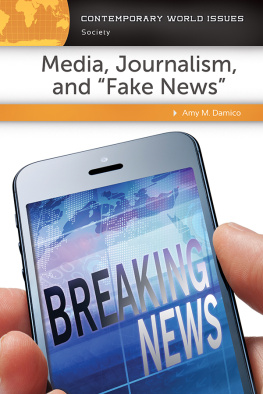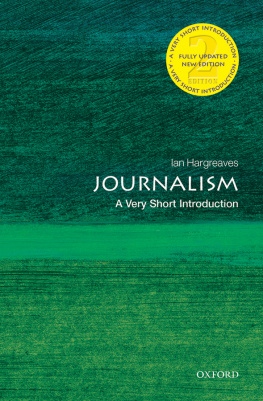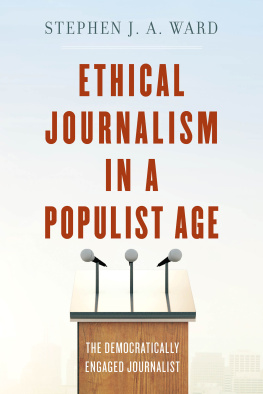
Journalism Ethics at the Crossroads
This book provides journalism students with an easy-to-read yet theoretically rich guide to the dialectics, contradictions, problems, and promises encapsulated in the term journalism ethics.
Offering an overview of a series of crises that have shaken global journalism to its foundations in the last decade, including the coronavirus pandemic, the Black Lives Matter movement, and the 2020 US presidential election, the book explores the structural and ethical problems that shape the journalism industry today. The authors discuss the three principle existential crises that continue to plague the news industry: a failing business model, technological disruption, and growing public mistrust of journalism. Other topics covered include social media ethics, privacy concerns, chequebook journalism, as well as a new analysis of journalism theory that critiques the well-worn tropes of objectivity, the Fourth Estate, freedom of the press, and the marketplace of ideas to develop a sophisticated materialist reimagining of journalism ethics.
This is a key text for students of journalism, mass communication, and media ethics, as well as for academics, researchers, and communications professionals interested in contemporary journalism ethics.
Roger Patching has spent more than half a century as a journalist and a journalism educator. He worked for nearly 20 years in daily journalism for a newspaper, radio station, and TV station in Adelaide, South Australia, before moving to Sydney to work for the international media wire service Australian Associated Press, followed by a decade with the national broadcaster ABC in Brisbane. Then followed more than 30 years at various Australian universities, teaching broadcast journalism, sports reporting, and ethics. He is a life member of the national journalism educators association JERAA. Roger has co-authored nine journalism texts. This is his fourth collaboration with Dr Hirst.
Martin Hirst is a founding director of the Centre for Journalism, Media and Democracy at AUT University in Auckland, NZ, and co-editor of the journal Political Economy of Communication, published by the International Association for Media and Communication Research. Martin is the author of News 2.0 (Allen & Unwin 2011) and Navigating Social Journalism (Routledge 2018). He has collaborated with other writers on From Broadcast to Narrowcast: Communication and New Media (Oxford 2007), Scooped: The Politics and Power of Journalism in Aotearoa New Zealand (AUT Press 2012), and So You Want to Be a Journalist (Cambridge 2012). Martin spent 20 years in journalism and a similar number of years in academia. He now writes and paints from his studio in Melbourne.
First published 2022
by Routledge
2 Park Square, Milton Park, Abingdon, Oxon OX14 4RN
and by Routledge
605 Third Avenue, New York, NY 10158
Routledge is an imprint of the Taylor & Francis Group, an informa business
2022 Roger Patching and Martin Hirst
The right of Roger Patching and Martin Hirst to be identified as authors of this work has been asserted by them in accordance with sections 77 and 78 of the Copyright, Designs and Patents Act 1988.
All rights reserved. No part of this book may be reprinted or reproduced or utilised in any form or by any electronic, mechanical, or other means, now known or hereafter invented, including photocopying and recording, or in any information storage or retrieval system, without permission in writing from the publishers.
Trademark notice: Product or corporate names may be trademarks or registered trademarks, and are used only for identification and explanation without intent to infringe.
British Library Cataloguing-in-Publication Data
A catalogue record for this book is available from the British Library
Library of Congress Cataloging-in-Publication Data
Names: Patching, Roger, 1944- author. | Hirst, Martin, author.
Title: Journalism ethics at the crossroads : democracy, fake news, and the news crisis / Roger Patching, Martin Hirst.
Description: London ; New York : Routledge, 2021. | Includes bibliographical references and index.
Identifiers: LCCN 2021007139 | ISBN 9780367197278 (hardback) | ISBN 9780367197285 (paperback) | ISBN 9780429242892 (ebook) Subjects: LCSH: Journalistic ethics. | Journalism--Objectivity. | Fake news. | Journalism--History--21st century.
Classification: LCC PN4756 .P38 2021 | DDC 174/.907--dc23
LC record available at https://lccn.loc.gov/2021007139
ISBN: 978-0-367-19727-8 (hbk)
ISBN: 978-0-367-19728-5 (pbk)
ISBN: 978-0-429-24289-2 (ebk)
DOI: 10.4324/9780429242892
Melbourne/Gold Coast 20 January 2021
This is not the book we intended to write. At the beginning of 2020 we were half-way through the writing process when the world was turned upside down. We all started talking about the rona and a new medical term entered our conversations: COVID-19. Life would never be the same again. The issues we had been writing aboutthe changes in the state of mainstream media worldwide and the impact that was having on journalistic ethicsexpanded exponentially. The major crises facing journalism in 2019falling trust in the media, the failing economics of the industry, the effects of digital technologies, and the fight against fake newswere swamped by the tsunami of the coronavirus pandemic. Then, in October 2020, President Donald Trump announced he too was infected with SARS-CoV-2 as the coronavirus is officially known (Wu et al. 2020). This truly was the October Surprise of the 2020 US presidential election race that, once again, upended any certainties and conventions surrounding the campaign. The campaign, the 3 November election, and the aftermath kept the entire world on the edge of its seat: Trump refused to concede and made outrageous false claims about the election being stolen from him. The media environment had become so toxic by this time that tens of millions of Americans believed Trumps lies. America was plunged into political turmoil.
Earlier in 2020, as the number of COVID-19 cases raced into the millions across the globe and the death toll climbed into the hundreds of thousands, another event that would shake the news media to its foundations took place in the United States. A policeman killed an unarmed black man, George Floyd, by crushing his neck with his knee for more than nine minutes. The death may have passed un-noticed globally had it not been for the ubiquitous passer-by recording the tragic event on a mobile phone. Mr Floyds death saw the rebirth of the Black Lives Matter movement in the US, andvirus-like, it too quickly spread worldwide. In the ensuing months of protests that continued across Americaand in some other Western countriesjournalists too became targets of police violence. A disturbing trend seemingly encouraged and applauded by President Trump (Spocchia ).
No return to the old normal
The surprises kept coming in 2021. The year opened with a mob of angry and confused Trump supporters storming into the Capitol building in Washington DC in the last desperate act of trying to overturn the results of the 3 November ballot. One woman was killed near the Congressional chamber when security guards opened fire. Outside in Freedom Plaza, Trump supporters took the former Presidents constant cries of fake media to their logical conclusion and smashed thousands of dollars of television equipment belonging to Associated Press.


